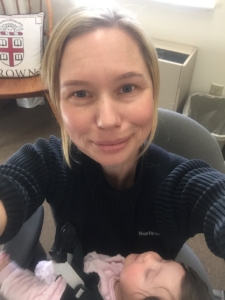Anorexia Nervosa: From Symptom Onset to Recovery Management
My eating disorder (”ED”), anorexia nervosa (AN), emerged when I was 12. Over time, like others, I learned to personify and separate the voice of “ED” from my own. “ED” constantly yelled at me, told me that I wasn’t enough, that I needed to count/restrict my calories, over-exercise, weigh myself, and sacrifice everything else in my life for the goal of being thin. EDs run in my family, and along with other disorders, genetically predisposed me to develop one.
Though it is a psychiatric illness, as with cancer, I did not make a “lifestyle choice” to become sick, suffer for 23 years, undergo several medication trials, attend countless psychotherapy sessions, and know that, at any moment, I could die. AN has the highest mortality rate of any psychiatric disorder due to medical complications and suicide. Both of these were issues for me at some point. So, AN is as “deadly serious” as cancer, but fortunately there has been some psychotropic medication and psychotherapy techniques that have led me to recovery.
My anxiety disorders (AD) were also genetically predisposed due to my family history, mostly emerged prior to my AN, and in some ways, still have trait remnants after my AN recovery. I was over anxious as a child, and an early “worrier” about many things that were out of my control (Generalized Anxiety Disorder; GAD), and this pattern continues to the present.
I correspondingly became a perfectionist, rationalizing that if I could focus on order, details, and exactness (Obsessive Compulsive Disorder; OCD), I would have more control of what was around me (I still have this trait). ”ED” seemingly calmed me by promising me that the way to be ”perfect” was to look the part on the outside by being very thin; if I could control my body, I could control everything else, and I will have achieved my “perfect” goal.
When I was living with AN, I felt as if I was constantly on “red level high alert.” My panic attacks would range from relatively minor (e.g., trying to untwist a twisted necklace) to more major circumstances (e.g. getting lost while driving, arriving late). A typical day would involve me encountering several scenarios where I couldn’t get something to work properly, I became extremely overwhelmed, frustrated, started crying, and either asked someone to fix it for me, or gave up on it. I had a (mostly self-imposed) list of to-dos that I felt had to be done right away, so I could never really relax. There was no distinction in my mind (and therefore my body) between events that were life-threatening vs. life-annoying. My sympathetic nervous system was triggering an ongoing “fight or flight” response in my body, and consequently, I reacted as if everything was a real crisis.
Consistently being in a state of “red level high alert” meant that I also always anticipated the worst outcomes. I constantly expected that I would disappoint others, and that they would be angry with me. Research supports my AN experience of heightened anxiety in anticipation of food, and little enjoyment of food while eating it. In recovery, I do not fear food, but I view it as fuel vs. looking forward to meals.
I have utilized many of the above neurobiology research constructs to educate my husband on AN. He has often reflected that, if he had known this information earlier (i.e., when I was still in AN, or just starting my recovery), it would have helped him to have more insight/empathy for me. In addition to medication, ongoing outpatient psychotherapy, and my dedicated team of ED experts (PCP, psychiatrist, nutritionist, therapist), my husband has been a solid, consistent support throughout my AN recovery process, which has been life-affirming.
The most important aspect of my recovery, though, is that I chose it for myself, not for others, to regain/discover my “sanity,” which is truly priceless. This is far more powerful than “ED.”
Heather Hower, MSW, LICSW, QCSW, ACSW has served on the board of the National Eating Disorders Association (NEDA) since 2013 (including the Development Committee, Research Advisory Council, Conference Committee Co-Chair), and collaborates with her NEDA colleagues on eating disorder research studies, papers, and presentations. Through her position at Brown University Department of Psychiatry and Human Behavior, she has also been collaborating with her local Rhode Island Hospital/Hasbro Children’s Hospital Eating Disorders Partial Hospital, Outpatient, and Home-Based clinical programs since 2013. Heather had anorexia nervosa for 23 years, and has been recovered since 2012.





